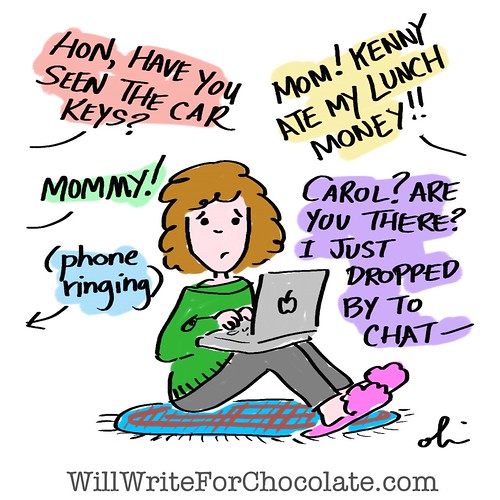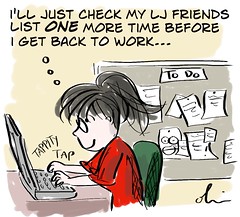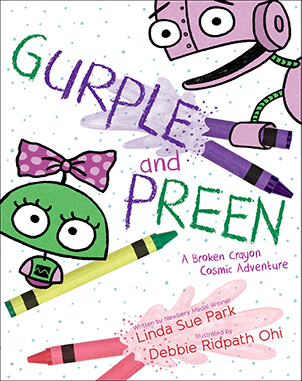Finding time to write (even if you have kids)
Relatively few writers have the luxury of devoting their entire workday to their writing. Some have day jobs while others may have school or young children at home. Finding the time to write can be a challenge.
Here are some tips for those trying to carve out some time for their writing. Keep in mind that what works for someone else may not work for you; you'll need to do some experimenting. In the end, it's not so much finding time to write as making time to write. If you have other tips to contribute, please do post them below!

- Get up an hour earlier to stay up an hour later. Deborah Ng wakes up at 4 am, for example, but this method doesn't work for all writers. As John August points out in this blog post: "Some how-to-be-a-writer books will recommend you get up an hour earlier, or stay up an hour later in order to write. If that works for you, God bless, because I need every bit of sleep I can get."
- If you write best in the morning, do some of your morning chores the evening before instead (e.g. making lunches for your children, setting out their clothes and school supplies, and so on).
- Learn how to get into "writing mode" quickly. If your writing time is limited, you don't have the luxury of easing gradually into writing time.
- One way to do this is to make sure you have everything you need in one place, so you don't waste precious minutes looking for a pen or your notes.
- Learn how to write in small chunks of time rather than only being able to write when you have a solid, uninterrupted period of time.

- Don't answer the phone. If it's important, they'll leave a message.
- Tell your family what you're doing so you can enlist their cooperation. Put a "DO NOT DISTURB" sign on your office or (if you don't have an office) have some other way of letting other household members that you aren't to be disturbed. Teach others to respect your time.
- Delegate some household chores. Put off housework until it really needs to be done.
- Cut down on some other non-essential daily activity, like watching tv or surfing the Web.
 |
- Take a hard look at other regular activities to see what can be given up so that you can get more writing time. Set your priorities.
- Set small, reachable goals. Instead of aiming for 1000 words a day, for example, try for 100 words. Or 50. Alternatively, set goals of writing for a certain period of time, such as 30 minutes a day. Or 15. Or 10. Writing every day will also help keep your project fresh in your mind, decreasing the time you need to mentally review before starting that day's session.
- Carry around a small notebook and a pen. If you find yourself in a traffic jam or waiting for something or someone, do some writing. I tend to focus on brainstorming about article ideas and potential markets, poetry and working out plot and characters for my novel.
From Shauna Smith Duty: "Being a parent who follows her passion (writing), as you know, is tough! I am constantly interrupted with pre-algbra and book report questions from my little darlings, and my dear husband works from home, too. My mother-in-law recently moved in with us, and she just walks around trying to stay out of everyone's way. It's a busy little home we live in, and writing/reading/editing is part of who I am. Everyone who loves me knows that at hockey games, I'm the one with a lap full of papers and a fistful of highlighters and red pens. In the morning, I'm the one holding an interview on the phone headset so I can type a book review with my hands. My kids know how to make coffee and take messages very well, thank goodness. I suppose they have two jobs, too - mom's personal assistants and being a fourth and fifth grader. "I applaud ALL parents who work at home with their children under foot (or under desk). Not only is it a sacrifice and a struggle, it's a great example for kids to learn how to work hard and juggle other responsiblities. Bravo, work-at-home parents!" |
After reading the tips above, you may still be sighing and convinced you're too busy to write. In that case, John Hewitt has some good advice at the end of his article Finding Time To Write:
"Writing is not for everyone. If you keep trying, and failing, to make the time to write, then it may not be for you. You may want to write, but if the desire is not enough to keep you from doing more entertaining or pressing activities, then perhaps writing isn’t for you. It may become more meaningful to you at another point in your life, but don’t feel guilty about letting it go. When it is important enough to you to make some sacrifices, you’ll be able to make them." |
Some useful online articles on this topic:
So, When Do You Find The Time To Write? by Ann Douglas. A frank and honest response to this frequently asked question, by a work-at-home mother. "Does my writing schedule work out perfectly day-after-day? Do I always sit down at my desk at exactly 9:30 am, open the lid of my computer, and type a brilliantly-worded sentence, smile to myself, and launch into my writing day? Of course not! That only happens in made-for-TV documentaries about writers -- and generally writers who don't have kids."
Finding Time To Write by Connie Shelton. Shelton manages to average writing one book a year while running a full-time publishing venture. Shelton offers useful tips to novelists.
Time and the Writer by Moira Allen. "Time is never 'found.' Time can only be 'made.' If you decide to wait until your kids are in school, or in college, or you have enough money to quit your day job, or retirement, you could wait forever. The only way to make those writing dreams come true is to start looking at the time you have now, today -- and find ways to make that time work for you instead of against you."
Finding Time To Write by Danielle Hollister at Bella Online. Hollister offers tips for mothers: "For some mothers, like me, our best time to write may be when our children are sleeping or at school depending upon their age."
Finding Time To Write When You Have No Time To Write by Karen Fenech at AbsoluteWrite.com. Fenech manages to grab time to write whenever she can: "Part of my problem with getting my writing done was that I wouldn’t write unless I could reserve a big block of time to do it. I rarely could do that, so I didn’t write at all."
Finding Time To Write by Sue Reichard. Reichard advises trying another type of writing if you're still having trouble finding time: "You say you've tried all of the above and you still have no time to write. Consider then, a different type of writing. Instead of a children's novel, write a short story, poetry or a filler for a children's magazine."
Finding Time To Write by John August. "I would take my PowerBook 180 into work, then type up those pages on my lunch break. Repeat this process for four weeks, and I’d written a script. As a bonus, I’d avoided banal office lunch conversation."
Finding Time To Write by Tamra Norton. This mother of seven (!!) found time to write. "I have learned through trial and error that my peak writing time - the time when I’m most creative and productive - is after my little ones have gone to bed."
 finding time,
finding time,  time management in
time management in  Blog/news
Blog/news 






Reader Comments (1)
Thank you! This was a great post!